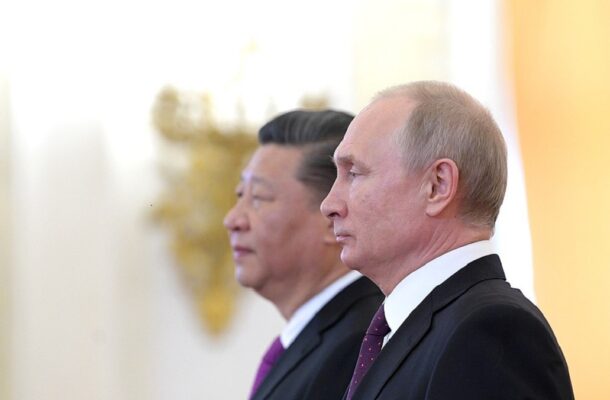The wider world in 2022

The year 2022 has been a critical test for democratic nations. While there is some good news in the changes to political leadership and support for Ukraine, the ongoing challenges of climate change and food insecurity demonstrate that much of the battle is still ahead.
All the world’s a stage, but in 2022 there have been some big changes in dramatic personae. Germany’s Angela Merkel has retired, Brazil’s Jair Bolsonaro and Australia’s Scott Morrison have been kicked out, the United Kingdom’s Boris Johnson has left in disgrace, Vladimir Putin is now branded a war criminal, and Donald Trump is diminished. Xi Jinping, by contrast, is more threatening than ever.
While it may have been a good year for Australia – except for those rain sodden families inundated by the East Coast floods – it has been a depressing year for the planet. Clearly, Australia as a nation and the world as a whole are failing to tackle the challenge of climate change.
The most recent United Nations report shows that although there has been some progress in reducing global greenhouse gas emissions, the world is still some way off reaching its goal of limiting a temperature rise to 1.5 degrees Celsius by the end of the century. According to the report, the combined climate pledges of 193 parties to the Paris Agreement could put the world on track for around 2.5 degrees of warming, way above the Paris targets.
Simon Stiell, executive secretary of UN Climate Change, tells us we are nowhere near the scale and pace of emission reductions required and that governments need to strengthen their climate action plans now and implement them in the next eight years.
Starkly, a report by the UN’s Intergovernmental Panel on Climate Change noted the particularly troubling fact that the wealthiest countries are responsible for disproportionately more emissions than developing countries, even though developing countries are experiencing more severe climate impacts.
What has concerned me is the cynical way in which some of those who made promises in Glasgow have actually boosted the expansion of fossil fuels, with the most recent example being the UK’s decision to allow the development of a new coal mine in northwest England.
The sinking of Joe Biden’s much proclaimed energy bill means that it will now be all but impossible for the United States to meet the target of 50 percent net carbon reductions by the end of this decade.
The other big downer of the year was, of course, Putin’s unprovoked attack on Ukraine in February. We must remind ourselves that this was no normal military operation in which an advancing army seeks to take out the opposition’s defence capabilities. It was a brutal and systematic operation designed to kill civilians, including children in schools, nurses in hospitals, and ordinary people.
When that failed – and led the European Commission to send a task force to Ukraine to collect evidence against Russia in preparation for a war crimes tribunal – Putin resorted to cutting off light and power to communities, including the city of Odesa, to freeze Ukrainians into submission.
But the damage to human life went far beyond that inflicted on Ukrainian citizens, much of whose country lies in ruins as we celebrate the holidays. For many months, Putin blocked the shipment of grain from Ukraine’s Black Sea ports, until Turkey eventually brokered a deal to allow some through.
But the war has also caused an acute shortage of fertilisers which has affected farmers the world over. Many of us watching world television news have been horrified by field reports from countries, particularly in Africa, where people – especially young children – are starving to death.
Food shortages have become one of the most pressing problems for international agencies in 2022. The World Bank reports that high food prices have triggered a global crisis that is driving millions more into extreme poverty, magnifying hunger and malnutrition.
According to a report from the Food and Agriculture Organisation and the World Food Programme, the number of people who are experiencing acute food insecurity and will need urgent assistance is likely to climb to 222 million in 53 countries and territories. The International Monetary Fund says that an additional $50 billion is required to end acute food insecurity.
Many countries are doing their best to help, but the inflationary headwinds stemming from the actions of the super-rich oil sheikhs has not helped. Despite the price of oil being at sustainable levels, the OPEC cartel decided to cut output by ten percent, which forced the price of crude oil up, ending in an inflationary increase at the fuel pump for most of us.
This deal was brokered by the prime minister of Saudi Arabia, Prince Mohammed bin Salman Al Saud, and his partners in the Persian Gulf who conspired with Putin in a joint deal to increase the oil price, considerably to Russia’s benefit. The rising price also benefited the United States but was harmful to European and other economies.
One country that felt the pain severely was Britain.Things were made worse by the aftermath of Brexit and the bizarre decision by Liz Truss, who was prime minister for just 44 days, to promote a budget which would have put her country into billions of dollars of unfunded debt, but for the financial markets turning against her.
In the United States, the big political story was the failure of the Trump-supported candidates in the November midterm elections. Republican leaders are now thinking twice about having the odious Trump as their leader.
Democrats also have a problem if Biden, a thoroughly decent man, decides to stand again at the age of 82. Vice President Kamala Harris has not yet positioned herself as a potential successor.
But the big story in America has been the rise and fall of cryptocurrencies. This has culminated with the bankruptcy and collapse of FTX, the digital token market’s dominant trading platform, and the arrest of its principal, Sam Bankman-Fried, on charges described as one of the biggest financial frauds in American history.
Fortunately, I can confirm some good news as a contrast to the rather gloomy picture of the year. The Americans appear to have made a major breakthrough towards zero carbon energy. A few days before Christmas, Energy Secretary Jennifer Granholm announced that US scientists had achieved energy gain in a fusion reaction for the first time, confirming that the technology could eventually provide an abundant, zero-carbon alternative to fossil fuels.
Unlike nuclear fission, the process produces no long-lived radioactive waste and emits no carbon. Scientists estimate a small cup of the fuel could power a house for more than 800 years, an amazing achievement which gives the US a new and deserved lead in clean energy.
This article was published by the Australian Institute for International Affairs.
Colin Chapman is a former president of AIIA NSW and a former vice-president Asia Pacific of a global geopolitical analysis company. When director of broadcasting at the Financial Times, he attended eight annual meetings of the World Economic Forum as a media leader and continues to follow its debates














